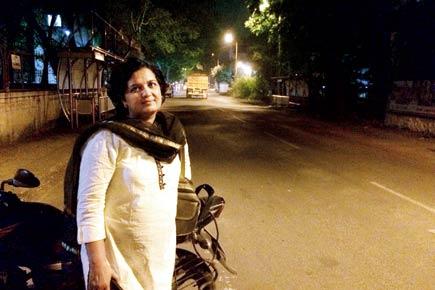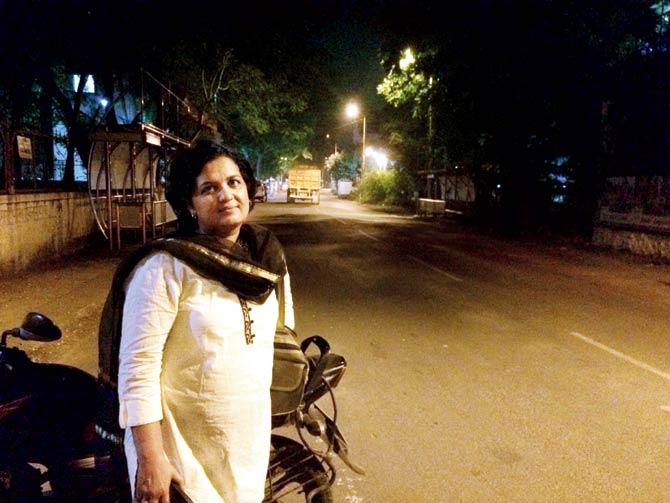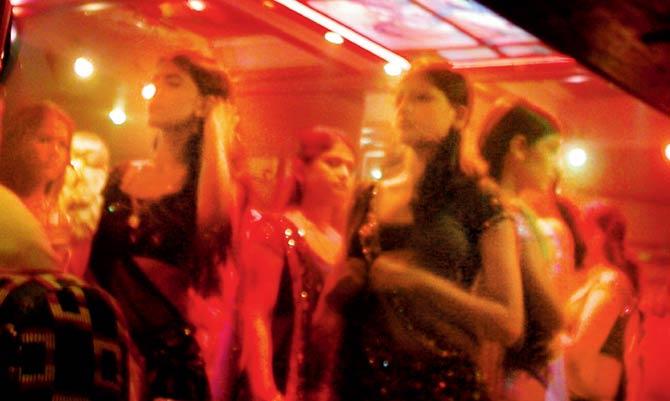With the state justifying the dance bar ban as one that will safeguard culture, mid-day meets Varsha Kale, the woman fighting to preserve the very dignity the state is determined to protect

Who is Varsha Kale? The homely face that goes to court to fight for the rights of bar girls? Or the woman whose womb a dancer has booked for her rebirth, because that's the only person she trusts to keep her safe.
Also Read: Supreme Court allows dance bars to reopen in Maharashtra
ADVERTISEMENT

Varsha Kale. Pic/Mitali Parekh
In the form of small hoops in her ears and a ring on her finger, Kale, 47, wears the only gold she owns. The rest, she says, she has sold in the last 10 years to help out-of-work bar girls sustain themselves after the Maharashtra government's 2005 dance bar ban.

Now, a glimmer of hope for dance bar girls banned in 2005
Kale, petitioner in the case opposing the state, saw a glimmer of hope on October 15 when the Supreme Court stayed the ban, offering women who were forced to slip into prostitution, the chance to earn their livelihood with dignity.
Read Story: Mumbai dance bars open: Woman crusader sceptical about government
But it emerged yesterday, that exactly a day later on October 16, in an affidavit, the government justified the dance bar ban as one that will protect the “culture of Maharashtra, dignity of women”. Kale seems optimistic. “Well, many of these girls are from traditional clans of performing artists...,” she says.
“And they [ruling party] are traditionalists, but people like Devendra Fadnavis are also logical, rational. So I have hope.” Kale, president of the Bharatiya Bar Girls’ Union, which she formed in 2003, was a middle-class girl from Dombivli before she adopted the cause. “As an activist working for domestic help, I’d take late the night train from Dadar home in Dombivli.
I’d see gangs of girls getting on and off, dressed in finery, or sometimes alike, as if in uniform, wearing make-up. They spoke seductively on the phone but didn't look like sex workers [who worked only in pockets and didn't commute]; I was curious who they were.”
Also Read: Here's how a sleepy little village launched Mumbai's famous dance bars
To understand this fascination, one needs to know this about Kale — she was raised in a Maratha home with a father who believed that girls should not adorn themselves — no pierced ears or noses, no dupattas, no bindis, hair so short that “nobody should be able to clutch it”. “Fond of dancing, my younger sister would turn on the cassette player and dance,” says Kale.
“I would shut it off and threaten to whack her. So the secrecy of the dance bar world drew me.” It would upset Kale that men stared at the girls, at their low cut blouses. “They'd say, ‘He’s looking at me, why are you getting angry? He’s not going to look at you’ and I knew that was true.” There is a vicarious pleasure as she mimics their irreverent and brash way of speaking.
Through journalist friends, Kale learnt about a hierarchy within the industry. There were singers and dancers, who were freelancers and earned lakhs a night. Then there were servers and “catering” girls who made a pittance. “I started travelling on all the train lines and realised that dance bars were everywhere. Slowly, my domestic worker contacts put me in touch with girls in their jhopadpattis.
They said the ‘Marathi’ girls would speak to me more freely. As I learnt about the industry, I found out that they had no trade union — the catering girls were ‘salaried’ while the dancing and singing girls were freelancers. I also learnt that they had been on strike on December 25, 1997 and brought the bar owners to their knees.
All their demands were met — that they get free water as an alternative to the two cold-drinks per night, fruit juice without sugar and 40 per cent share in the tip left for them; 30 per cent if the bar owner arranged for transport back and forth.”
When she asked them who organised the strike, she was told it was the “khandaani girls” from Congress House and Benaras ki Chawl. They came from old entertaining clans and sects, the ones who survived the years after the ban best.
“They lived within an ecosystem that cared for them,” says Kale, who now lives in Pune. “They invested their money well, married or had arrangements within the community. The other girls were primary earning members in a family; would be duped by men who were already married and didn't know anything about financial foresight or prudence.”
Which is why the need for a union. While looking into the industry, Kale realised that when the police raided dance bars, often, there was no “complainant” — a prerequisite if they were to be booked under sections 293 and 294 for obscenity. Since these girls did not see themselves as sex-workers, social work outreach ignored them. Funds allocated to fight HIV didn’t trickle down to them since they were not seen to be at risk.
The 2005 ban pushed the non-khandaani girls in to the claws of those they feared most — traffickers. “With no income, it was they who could get them work,” says Kale. “Lodging and boarding places offered an RR Package of ‘'two girls, six condoms and two cold drinks’. After the cuts and payment to the venue, they made no more than Rs 100 a night.
Unused to sex trade, the girls had no idea how to protect themselves and were often victims of fatal sexual violence.” About 65,000 girls committed suicide in the first eight months after the ban, Kale says. “Those were the real hard times for me; not the ups and downs of the case or the government. In those days, it seemed that all we were doing was lifting bodies.”
Read Story: Bar dancers hail SC's decision to lift ban on dance bars in Maharashtra
There are some who got away — like the girl who went to Dubai and married a software engineer. Or this one who is newly religious and has just sent Kale a voice message on What’s App, telling her something auspicious about this day on Navratri and the function she has organised to commemorate it.
And what would be the ideal situation for Kale? “That the girls are on the salary rolls of dance bars so they can become economic citizens,” she says clearly. “Their tips and charges should be added to the bill along with the food and drink, so that the girl can collect it rightfully at the end of the day. There should be payslips so that they can avail of loans, investment opportunities, bank accounts.” Simple. And then, not.
 Subscribe today by clicking the link and stay updated with the latest news!" Click here!
Subscribe today by clicking the link and stay updated with the latest news!" Click here!







